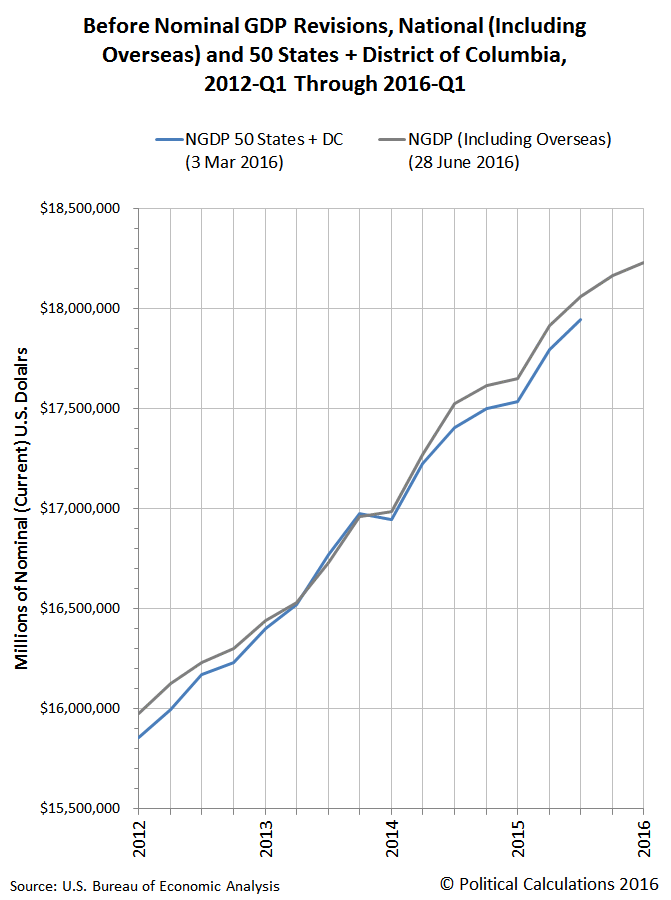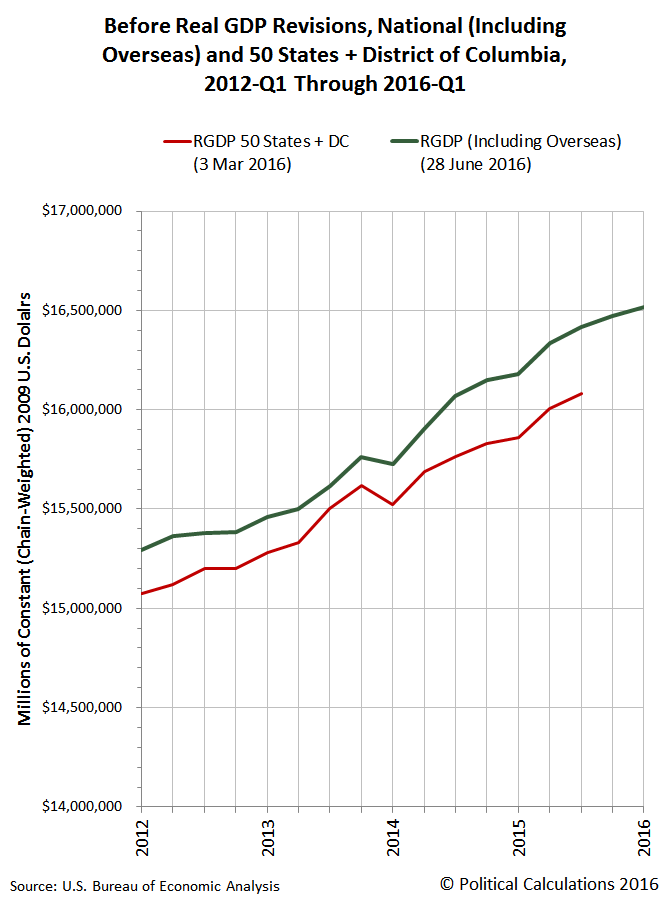The 2016 GDP Data Revisions
We've had a lot of fun over the last month and a half diving into GDP revisions, where we were the first ones ever to try to use brand new series of data from the Bureau of Economic Analysis on the Domestic portion of the U.S.' GDP to anticipate what changes would be in store for the BEA'a big annual revision of the nation's total Gross Domestic Product.
What is the Domestic portion of the U.S.' GDP? It is the part of the nation's GDP that is generated only within the domestic territory of the United States, which includes the 50 individual states and the District of Columbia.
It differs from the nation's total GDP mainly in that it does not include the contribution to GDP from Overseas Federal Military and Civilian Government Activities. If not for things like fighting wars in foreign countries, which we think is the predominant contributor to that source of GDP, followed to a lesser extent to things like renovating U.S. embassies abroad, or to a much lesser extent, things like U.S. state department officials handing out grants to fly foreign filmmakers to Los Angeles to attend training classes at UCLA so they could "become acquainted with American culture and American values", which while wasteful, likely does perversely contribute to U.S. total GDP.
It also differs slightly because of the methods the BEA uses to calculate domestic GDP, which subtracts intermediate outputs from the nation's gross productive output. Total GDP is typically calculated using an expenditure approach, which is calculated as the sum of the nation's consumption, investment, government expenditures and net exports. In theory, the two approaches should lead to the same figure, but differences in the imperfect data series used to calculate each will lead to noticeable differences in results.
As we'll demonstrate, the contribution of GDP from overseas federal military and civilian government activities to the nation's total GDP is highly significant. In our first chart, we've animated the "Before" and "After" amounts of nominal GDP reported by the BEA for both the Domestic portion of the U.S.' GDP (that for the 50 states plus the District of Columbia) and the nation's total GDP (including overseas), in each quarter from 2012-Q1 through 2015-Q3, which covers the period in which GDP was revised the most from previously published figures.

To help keep track of the action for each data series, we identified the applicable dates that apply for the "Pre-Revision" data and the "Post-Revision" data. For the Domestic portion of GDP, the pre-revision date reflects the data that was published by the BEA on or before 3 March 2016, which was subsequently revised on 14 June 2016, marking the post-revision date. The national level GDP data (including GDP generated overseas by the U.S. government), the pre-revision date is 28 June 2016 and the post-revision date is just over one month later, on 29 July 2016.
As you can see in the Before and After snapshots of the U.S.' nominal GDP data, there was a small upward revision in total GDP in the period from 2013-Q1 onward, and a very significant downward revision in domestic GDP, which was limited to the period between 2012-Q2 and 2014-Q2.
Since the domestic GDP data was revised over a month and a half earlier than total U.S. GDP, we hypothesized that it might be signaling that the U.S.' total GDP was in for a similar downward revision, reasoning that revision would be the foundation for the total GDP revision coming at the end of July 2016. And since that data series is virtually brand new, where the BEA has only just recently started published data for quarterly domestic GDP on a regular and more timely basis, we're confident that no one before us had ever thought to try it out.
We recognized that the only thing that would affect whether that outcome would hold would be how the contribution of Overseas Federal Military and Civilian Government Activities to total GDP would itself be revised, and outlined three scenarios for how that single factor would affect the total GDP revision coming on 29 July 2016.
- If that contribution is greater than what the BEA has previously indicated, the amount by which real GDP through 2015-Q4 will be adjusted will be smaller. So instead of being reduced by 1.1% as we've projected to be "most likely", it would instead be reduced by a smaller percentage, or in the very unlikely case that contribution is much, much greater, real GDP through 2015-Q4 could be adjusted upward. For this scenario to occur, it would mean that the U.S. government was much more engaged in fighting wars overseas in a way that adds to the nation's GDP than it has previously indicated. This is the "under" scenario.
- If that contribution is less than that the BEA has previously indicated, the amount by which real GDP through 2015-Q4 will be adjusted downward will be larger, going in the direction of what we calculated would be the maximum likely revision. For this scenario to occur, it would mean that the U.S. government was engaged in less "productive" military and civilian government activities overseas than it has previously indicated. This is the "over" scenario.
- If the contribution is the same as what the BEA has previously indicated, then we'll see the "most likely" scenario we calculated be the actual result. Real GDP through 2015-Q4 would be decreased by about 1.1% from the level that was recorded earlier this year on 29 March 2016. This might be considered the "null" scenario.
If you looked at the Before and After pictures for the nominal GDP data, you already know which of these three scenarios won out, but we think that it's easier to see the answer in the Before and After revision pictures for the real GDP data.

The "Under" scenario won out, as the contribution of Overseas Federal Military and Civilian Government Activities to total GDP was itself revised dramatically upward. Not only did it completely offset the large negative revision to domestic GDP in the period from 2012-Q2 through 2014-Q2, it added an extra amount above and beyond that amount to these quarters and also from 2014-Q2 through the present.
For the period from 2012-Q2 through 2014-Q2, the BEA's 29 July 2016 revision makes clear that much of the GDP that it had previously attributed to domestic GDP, meaning that they had previously indicated was generated within the 50 individual states and the District of Columbia, was instead generated from things the U.S. government did outside the nation's borders.
And then, it generated even more GDP outside the domestic territory of the U.S., contributing to the overall upward revision in the nation's total real GDP.
That discrepancy between the U.S.' total GDP and its domestic GDP also helps explain something that has become increasingly obvious - GDP is increasingly becoming less relevant and useful as a measure of the economic welfare of Americans living inside the 50 U.S. states and the District of Columbia. To the extent that Overseas Federal Military and Civilian Government Activities is boosting total GDP, it is contributing to a somewhat misleading picture as to the state of the economy that U.S. residents are actually experiencing.
For the bottom line, our hypothesis that the U.S.' total GDP would be revised downward proved to be wrong, which is great news! We put out a hypothesis, subjected it to a real world test, and the real world showed us that how the BEA's domestic GDP is revised is itself not necessarily a good predictor of how total GDP will be revised when that is done a month and half later. In that process, we advanced our own knowledge and hopefully added to the body of knowledge for the field by sharing our progress and also by emphasizing the mistakes we made along the way in an entertaining fashion.
Disclosure: None.



